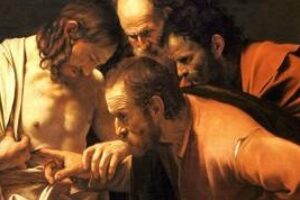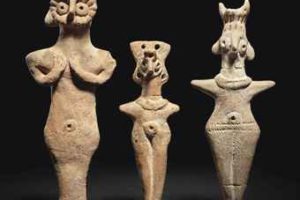A friend of mine, whom I love for his warm but temperate heart, expresses the concern that the Christian faith, once normalized in the prevailing culture, will suffer a weakened witness. In many places a normalized church has been a worldly church, and one does not wish to see (for instance) the Church in China suffer the degradations of the Church of England.
We agree that the word of God is infallibly applicable to all, Christian and pagan alike; at issue is whether it be good for the Church to seek more than an underground status [1]. We differ on the wisdom of trying to gain widespread outward acceptance of God’s word, because it is clear that the Christianity of the wide gate and the broad path will not save anyone: it is rather a road to hell, paved with good intentions. Worldliness, we both recognize, is the means whereby the Church is led into apostasy. Here my friend believes a culturally established church will almost certainly fall prey to the world, the flesh and the devil; I contend for my part that a refusal to be established is equally dangerous.
In the interest of catholicity, and also of Christian charity, I think it necessary to observe a certain respect for the faith of our fathers, without whom we should lack a great deal of knowledge and certainty about the substance of our faith. Since it is to these our fathers that we owe our very orthodoxy preserved and defended, we must acknowledge that they have the Holy Spirit no less than we, to discern the meaning of the Scriptures. We should not condemn in them what was not an error; we should take care to limit our dissent to what was wrongly thought or done. The holy fathers were no worldly men. St John Chrysostom spoke out against the frivolity of those who attended his sermons for a show, and few men have spoken more fiercely against worldly amusement and delusion: in his pulpit was the fire of the Holy Ghost.
St Chrysostom, like St Athanasius of Alexandria before him, suffered exile at the hands of the civil authorities, who though baptized Christians were unwilling to accept their teaching. Their courage is an example to us all. Yet not once did they speak out against the establishment as a threat to the Church: their way was to call the rulers to account before the judgement of the word of God. What they condemned was not the mixing of church and state but the mixing of Christ and Belial: what they abhorred was not the wickedness of state power but the wickedness of the human heart, and what they hoped was that souls once called might continually trust Christ and be saved from the Enemy. Did they call the civil establishment their enemy? No, they regarded it as a friend, a holy ministry of God, if the magistrates would hear God’s voice and not harden their hearts against the counsel of wisdom. The kingly ministry was indeed to help the gospel, not hinder it, just as the kings of ancient Israel were to help holiness and punish wickedness. Now, instead of one Israel in one land, there were to be godly kings in every land to rule together a single Church visible on earth, showing the invisible Jerusalem above. These various commonwealths would have not only Israelites but also Gibeonites and strangers; yet their kings would be of Zion, baptized in the Christian faith. In latter days, though, we have seen strangers demanding that Christian kings adopt their heathen ways; accommodation has been a disaster for the holiness of the Church.
What we see, then, is this: the difference between a worldly Rome and a godly Geneva is not establishment and disestablishment, but whether the word of God be faithfully proclaimed and obeyed. To be seduced by worldly wealth and power is to fall into sin, but to hold earthly power is no more a sin than to be rich in gold. The key is in every generation to be willing martyrs for the gospel, in living as well as in dying, not timid but bold to preach God’s word.[ftn.2] In this way did St Ambrose of Milan bring to penitence the emperor Theodosius, who had massacred 7000 Thessalonians in wrath. A worldly bishop, feigning angelic sanctity, would have held his peace and stood under God’s judgement for his silence. Here it is clear that St Ambrose, using the ministry of excommunication, called the emperor to the cross of discipleship, and this he did as a bishop who for his piety was not despised but respected. No less is this Bishop of Milan to be honoured than his fellow bishops in Constantinople and Alexandria, though he was heeded and the others exiled: all of them spoke boldly where ‘angels fear to tread’. Surely it was better, not worse, that the bishop’s authority was heard with reverence and not with scorn.
For holiness lies not in the shunning of power but in the right use of it. A bishop who calls the world to a salvation without discipleship has not understood the gospel at all; but a bishop who uses his moral authority to call the world to God’s judgement has understood the ministry of the Holy Ghost, both in his own heart and in the visible Church. It is a false humility that will not teach the world the supremacy of Christ. Not for our power must we raise our voices, but for safety and justice for others. To do otherwise might be just if it were ever just to muzzle God’s word; but there is no safety in muzzling God’s word anywhere, and any pastor who withholds a part of it denies and attacks the vows of his own ordination.
Surely we grow under chastisement, but we need not make more trouble for ourselves: God will chastise us as he sees fit, that we may seek his face. Or are we to hope always to be ruled by those who will not hear God’s voice, and who will therefore not submit their judgements to God? Shall we rejoice in such a thing? God forbid, for love does not delight in evil, but rejoices with the truth. We cannot but rejoice if the truth prevails, be it outwardly or inwardly. The inward embrace of truth is the duty of every man and the secret work of the Holy Ghost; the outward living of an honest life is the thank-offering of every Christian.
For the Christian statesman this includes the duties of public office, faithfully discharged according to the word of God. The work of an Edward VI, the work of a William Wilberforce, the work of a Gao Zhisheng, the work of a thousand Christian jurists holding laws to the authority of Scripture and its principles, is not to be taken lightly. Where a pastor tells the world to obey God, he does well; where to disobey, he does wickedly. Likewise for King and Parliament. A godly ruler may be ridiculed as a holy fool; but he has, we hope, already counted the cost of following Christ and the cost of not following Christ, and chosen the better part. We see in Liechtenstein how the Hereditary Prince, Alois Philipp Maria, has risked his crown to defeat the abortion lobby in the country. Some, no doubt, will sneer at his recalcitrance, but he would rather renounce the crown of Liechtenstein than forsake the crown of Christ. An anti-establishment Christian might call for him to separate himself from the governance of the country or to stop favouring Christianity, but most of us instinctively know he has done the right thing.[ftn.3] Establishment reveals the law to all, to believer and unbeliever alike, that the gospel may shine brighter still.
But perhaps a large church is not to be desired. Perhaps it is better that fewer come outwardly to God, that the zeal of the average churchgoer may be high because the elect are few. Perhaps it is only the election of the few that matters, and only the godly are to remain as Christians in our assemblies, that to those alone who have strong faith may be imputed the name of Christian. Then zealous faith is prerequisite and weak faith despised. Those who would choose this alternative, I urge to remember how haltingly we have often approached God, with what tiny mustard-seeds of faith, with what little purity of purpose and intention. Surely many of us have been drawn to the light not knowing what it was, knowing only that to have it was better than not to have it.
Consider how many children sit in church not understanding how their elders can be so consumed with a God they have never seen, and what long years their parents may pray for them to receive the fulness of the Holy Ghost, to see as they do what is the breadth, and length, and depth, and height. Children are ignorant, and their depravity is in full view; yet Jesus said, Suffer the little children to come unto me, and forbid them not: for of such is the kingdom of God. Such bumbling approaches, which fill the Church with corrupt hearts and dark souls, we ought rather to approve than to despise.
Many have always joined the visible Church for other reasons than living faith: it has not taken popular or official acceptance to cause this kind of profession. With the Lord’s patience these have been welcomed into the Church for a time. We do not know why our Lord chose Judas Iscariot, yet he did so, even though Judas’ faith was later to prove unsound; behold also Simon Magus, Alexander the coppersmith and Demas, in love with the present world, who all fell away because Christ was not the true foundation of their faith. What the Lord says is not to hold off entering the Church but to always to count the cost and take heed how we hear the word, that we may be not hard-beaten paths, nor rock ground, nor thorn-choked patches, but good soil yielding a hundredfold the word sown into us. The cost of following the Lord is tribulation in this life, but the cost of doing otherwise is the loss of everything good that we have ever known. The point is with the grace of the Holy Ghost to observe how much greater is Christ than all things that pretend to rival him, how much more blessed his love than anything else in the world. For the essence of every good is his gracious love, his righteousness, his faithfulness, his gift of himself for the life of the world. However little we see of this, however faintly we know it, we must take no other course than to yield ourselves, little as we understand, into the arms of his mercy.
Is it not better that the whole world, though weak in faith, should sit at the feet of Jesus Christ, even at the urging of the magistrates, than that they continue their wickedness unabated, to harden themselves in Egypt against the God of Abraham? Is it not better for the nations to flock to Zion, though not knowing just how serious their condition is, that they might be enlightened? Is it not better, even for the souls of a few, to be thus disposed, and for their neighbours to leave them undisturbed to hear God’s word and be confronted with the desperate wickedness of their hearts? Is it not better, in short, when the faith has the protection of a godly magistrate? It is far better to have a godly king than a godless.
____________
[1]: In mainland China I prefer to call the unregistered church the non-juror church, the church that will not swear loyalty to the Communist régime.
____________
 Lue-Yee Tsang, B.A. Californiensis (Berkeley), is a new teacher at Grace Classical Academy in southern California. A moderately high-church evangelical Anglican, he is interested in extending and deepening the spirituality of the Protestant churches on the catholic lines of the magistratical Reformers. Following what Confucius calls the rectification of names, he will not consent to use inaccurate language to his own prejudice, for which reason it has been years since he last referred to a Christian of the Roman discipline as a ‘Catholic’. It has been found, moreover, that he does not go three days (or is it three hours?) without either making an Old Testament reference or mentioning a bishop, and he is amazed that he has not yet found a place in this profile to mention the 1662 Book of Common Prayer and to enjoin the singing of psalms. He enjoys Renaissance church music, Lagavulin and the occasional blasphemous allusion.
Lue-Yee Tsang, B.A. Californiensis (Berkeley), is a new teacher at Grace Classical Academy in southern California. A moderately high-church evangelical Anglican, he is interested in extending and deepening the spirituality of the Protestant churches on the catholic lines of the magistratical Reformers. Following what Confucius calls the rectification of names, he will not consent to use inaccurate language to his own prejudice, for which reason it has been years since he last referred to a Christian of the Roman discipline as a ‘Catholic’. It has been found, moreover, that he does not go three days (or is it three hours?) without either making an Old Testament reference or mentioning a bishop, and he is amazed that he has not yet found a place in this profile to mention the 1662 Book of Common Prayer and to enjoin the singing of psalms. He enjoys Renaissance church music, Lagavulin and the occasional blasphemous allusion.





Leave a Reply
Your email is safe with us.